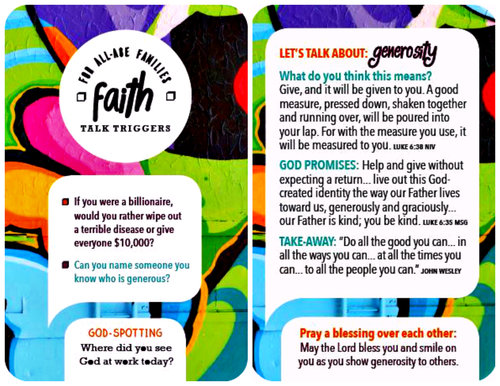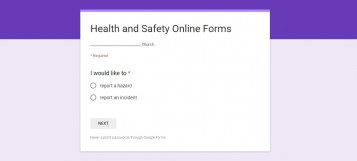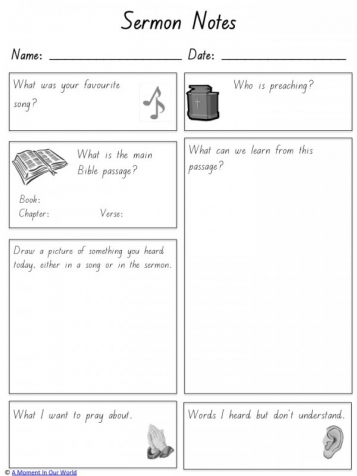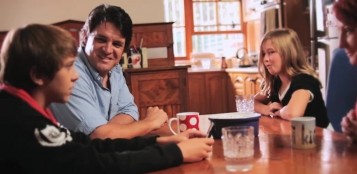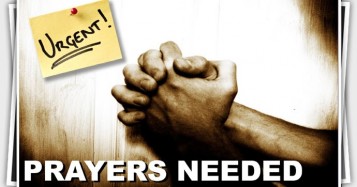Studies show the most important factor for a teen to stay in the Christian faith is the example of the parent’s faith. But a more nuanced – and accurate – understanding is, it’s not so much what the parents believe, but what the teenagers perceive they believe.
Here are 12 great examples of parents connecting and modelling faith. Perhaps one or a variation of these may work in your setting?
1. The family meeting
After dinner on Tuesday, the Welborn family clears the dishes from the table and sits back down for their weekly family meeting. Tom and Marcia start the meeting to give their family a chance to share their perspectives on what’s going well – and not so well – in their household. It has become a time to review the week ahead, so everyone understands the logistics of sports etc.
Often the meeting will have a theme like, “How can we be more of a team?”, and sometimes topics get bounced around from dinner leftovers to who’s feeling left out?
Often, the kids will bring prayer requests. And even pray aloud. Their family meetings can be long, or just a few minutes. Sometimes they bring bible verses. Usually, the kids enjoy it; but if their attention wanes, they ask how their time can be improved.
But most importantly they set a culture where “we make sure the kids know they have a voice and can share their experience, so that they know their feelings matter.”
2. The Twelve-year-old Trip
As a youth leader, I would often tell families that a student who attends a weekend retreat experiences the relationship equivalent to attending youth group for about six months.
Many families are taking on this idea too. Whether this is booking a motel room for a night, or a sleepover in the living room, or camping in the backyard.
The Fitches take on this as a bit of a rite of passage. The Twelve-year-old trip.
When each of the kids turns twelve, they get a weekend away with the parent of the same gender. They fly, stay in a hotel, get introduced to journaling, do a service project and have some good fun.
3. Monthly Dates
Especially with big families, it is easy to not to connect personally with each kid individually often enough.
Gabe spends an hour with each of their kids on their monthly birthday dates. Eg, his eldest was born on the 8th May, so on the 8 of each month, he spends an hour one on one doing what they want, playing a board game, going on a hike etc.
Gabe says it’s only 3 hours out of his month, he has yet to miss one, and even if he wanted to, his kids wouldn’t let him.
4. How Can I pray for you?
Tammi wants her teenage boys to know that not only is she willing to spend time with them talking about God, but that she spends time every day talking to God about them. So she often asks her sons a simple question like:
How can I be praying for you?
She either writes down their answers or asks them to. Then, she keeps the sheets they have written in her prayer journal, but she makes copies to give back to her boys, so they have reminders of her specific prayers for them.
By asking this simple question, Tammi learns more about her boy’s struggle and dreams, and the boys learn more about their mum’s passion for prayer.
5. Loving online (LOL)
As parents, we can use technology to:
- Let our kids know we are available for them at any time
- Tell them we thinking of them
- Remind them that we are praying for them, given what they are facing at school that day
- Share a Bible verse
- Send them pictures of things we are seeing or eating that reminds us of them.
6. High School Bible
Wanting to show their 16-year-old son how much they care about him, Pete and Kathy bought a bible for him. But they didn’t give it to him. They kept it for themselves for the next two years as their own devotional Bible. They prayed through it and made notes in it about passages that specifically related to their son.
Then they presented it to him when he turned 18.
Pete and Kathy did the same for their other three children, starting when they turned 16. For all four of their young adult children, that Bible (even when it sits unopened on a bedroom shelf) is a powerful symbol of their parents’ spiritual investment.
7. Weekly Coffee shop Meeting
Dave wanted to study a book about godliness with his seventeen-year-old son, but wanted the discussions to feel special and manly. So instead of talking at home, Dave and his son met at a coffee shop in the city before they both came home from school and work.
In talking through each chapter, father and son answer questions like: what stood out to you about this chapter? What questions do you have?
Dave’s son loves meeting his dad at a coffee shop and being treated like a peer (well, almost like a peer). Dave still buys both their drinks, which he feels is a small price to pay for the weekly chats with his son.
8. What adults do you like?
In a youth group setting, we will often say we want one leader for every 5 young people, allowing the leaders to invest time and effort in a small number of young people. As a parent you may want to switch that ratio: I want 5 adults for my child, who know them, care and pray for them, occasionally showing up to netball games etc. These people, who you have vetted as safe, can form a web of support for your child.
Susan, knowing she didn’t need to keep her 5:1 team a secret, periodically asks her teenage daughter, what adults do you like? Which of our relatives would you like to get to know better? She mentally files away her answer, so when the family has free time for lunch after church, or her daughter has a big netball game, she knows who to invite.
9. Dad’s Camping Trip
Glenn’s wife is more a hotel kind of woman rather than a camping kind of person. But since Glenn wanted to expose his kids to the fine art of camping, four years ago, he and three other dads took their kids.
Since then, it has grown year on year. This year, 7 dads and 22 kids, went camping, tramping, cooked over open fire, swam, shared practical jokes, and played cricket. Dads and kids cross-pollinated.
And in case you were wondering, none of the mums have yet to complain about the annual camping trip.
10. Wow, Pow, Holy Cow, How
Each night at the dinner table the Smith family discuss four topics related to their day:
- Wow is the best part of the day
- Pow is the worst part of the day
- Holy Cow is something in their day that pointed them to God
- How is an opportunity in their day to be the answer to someone else’s prayer
11. Bread and butter Dinner
In New Zealand, “40% of households go hungry, skip meals or scrimp on ingredients because they are not ‘food secure’” (Stuff.co.nz, Healthy eating hard for poor.)
Bryan and Shelly wanted to give their kids a taste of what it’s like to scrimp on food.
Together with their 12 and 10-year-old, they came up with the idea of “bread and butter Sunday dinner.”
Each Sunday, they eat slices of bread with margarine rather than their usual meal. Sometimes they add the luxury of jam, but they always donate the money saved from a more elaborate Sunday dinner to a local homeless ministry.
Credit
Many of these ideas came from Sticky Faith Guide for your family
